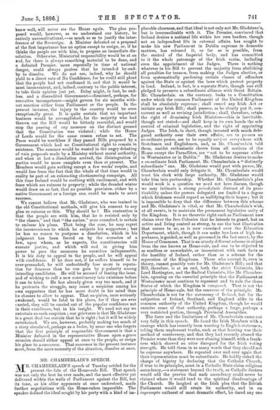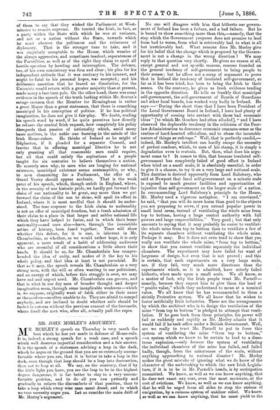MR. CHAMBERLAIN'S SPEECH.
MR. CHAMBERLAIN'S speech of Tuesday settled for the present the fate of the Home-rule Bill. That speech was not only the best he ever made, and the most effective yet delivered within the walls of Parliament against the Bill, but its tone, as his abler opponents at once understood, made further negotiations with the Home-rulers impossible. The speaker defined the ideal sought by his party with a kind of im- placable clearness, and that ideal is not only not Mr. Gladstone's, but is irreconcileable with it. The Premier, convinced that Ireland desires a national life within her own borders, though not an independent life in external affairs, has sought to make his new Parliament in Dublin supreme in domestic matters, has released it, so far as is possible, from the control of the Imperial body, and has committed to it the whole patronage of the Irish realm, including even the appointment of the Judges. There is nothing whatever in his Bill to prevent the majority from abolishing all penalties for treason, from making the Judges elective, or from systematically pardoning certain classes of offenders against the State or against the laws which protect property in land. Ireland, in fact, is a separate State, though one still pledged to preserve a subordinate alliance with Great Britain. Mr. Chamberlain, on the contrary, looks to a Constitution under which the common Parliament of the United Kingdom shall be absolutely supreme ; shall cancel any Irish Act or initiate any Irish Bill ; shall possess, as he clearly put it, con- current as well as revising jurisdiction ; shall, therefore, retain the right of dismissing Irish Ministers—this is inevitable,. though not stated—and shall keep in its own hands the sole control of criminal legislation, and the right of appointing Judges. The Irish, in short, though invested with much dele- gated authority over their own affairs, are to possess no co-ordinate power, are to be equally subject everywhere with Scotchmen and Englishmen, and, as Mr. Chamhei lain told them, amidst enthusiastic cheers from all sections of the House except the Parnellites, are "not to be supreme either in Westminster or in Dublin." Mr. Gladstone desires to make a co-ordinate Irish Parliament, Mr. Chamberlain a " distinctly subordinate " one. Mr. Gladstone would part with power, Mr. Chamberlain would only delegate it. Mr. Chamberlain would. trust his clerk with large authority, Mr. Gladstone would take him into partnership. Whether Mr. Chamberlain's plan• would work is a question we need not here discuss, though. we may intimate a strong primd-facie distrust of its prac- ticability unless the powers delegated are limited to a degree which Irishmen would regard as nullifying their hopes ; but it is impossible to deny that the difference between this scheme and Mr. Gladstone's is vital, or that Mr. Chamberlain's wish, at all events, is to maintain the permanent legislative unity of the Kingdom. It is no theoretic right such as Parliament now claims over the free Colonies that he intends to guard, but an active and living control as strong, to use the best illustration that occurs to us, as is now exercised over the Education. Department, which, though it can make bye-laws of high im- portance, is guided, as well as governed in the last resort, by the House of Commons. That is an utterly different scheme in object from the one known as Home-rule, and one to be objected to- es needless or unworkable, or inconsistent with such facts as the hostility of Ireland, rather than as a scheme for the separation of the Kingdoms. Those who acccept it, even in theory, cannot possibly vote for Mr. Gladstone's Bill ; and that. Bill, therefore, is at an end, both the strict Unionists, like Lord Hartington, and the Radical Unionists, like Mr. Chamber- lain, agreeing on the essential principle that the Parliament at
Westminster must continue to represent and to rule the three States of which the Kingdom is composed. That is not the principle of Home-rule, but the converse of the principle. Mr. Chamberlain is not for the autonomy of Ireland, but for the subjection of Ireland, Scotland, and England alike to the common authority of the United Kingdom, though he would exercise some of that authority, perhaps a large, perhaps a very restricted portion, through Provincial Assemblies.
The force and the limitations of Mr. Chamberlain came out very fully in this speech. He faced the Irish Members with a courage which has recently been wanting to Englieh statesmen, telling them unpleasant truths, such as that hooting was their method of controversy, and that they had recently abused the Premier worse than they were now abusing himself, with a frank- ness which showed an utter disregard for the Irish voting strength. He told them in so many words that they should not be supreme anywhere. He repeated over and over again that their representation must be subordinate. He boldly risked the charge of bigotry by declaring that the Catholic Church, if true to its principles, must in a Catholic State claim religious ascendency,—a statement beyond the truth, as Catholic doctors would add the proviso that such ascendency could never be
claimed where it would tend to the spiritual disadvantage of the Church. He laughed at the Irish plea that the British Parliament would still retain its authority, and in an impromptu outburst of most dramatic effect, he dared any one of -them to say that they wished the Parliament at West- minster to remain supreme. He treated -the •Irish, in fact, as a party within the State with which he was at variance, and not as a nation without the State, towards which he must observe the politeness and the retioences of diplomacy. That is the stronger tone to take, and it was singularly acceptable to the House, which wearies of the always aggressive, and sometimes insolent, separateness of the Parnellitee, as well as of the right they claim to spoil all hostile speeches by howling and interruption. The defence, too, of his own consistency was firm and clear ; his plea for his independent attitude that it was contrary to his interest, and might be fatal to his personal hopes, was accepted ; and his deliberate assertion that he feared no dissolution, for the Unionists would return with a greater majority than at present, made many a face turn pale. On the other hand, there was some evidence in the speech of the truth lurking within Mr. Sexton's savage sarcasm that the Member for Birmingham is rather a great Mayor than a great statesman, that there-is something municipal in his conception of politics. If he has political imagination, he does not give it fair-play. We doubt, reading his speech word by word, if he quite perceives how directly he refuses the central Irish request, how- completely his policy disregards that passion of nationality which, amid many baser motives, is the noble --one -burning in the-minds of the Irish Home-rulers. He thinks of Ireland as •he might of Edgbaston, if it pleaded for a separate Council, and fancies that in offering municipal liberties he is not only granting all that reasonable men could require, but all that could satisfy the aspirations of a people taught for six centuries to believe themselves a .nation. He scarcely sees why, to men who are longing for national existence, municipal existence seems contemptible, or why, to men clamouring for a Parliament, the offer of a Grand Vestry should appear sardonic. That is the weak point of his speech, which, though unfelt in England, where, in the serenity of our historic pride, we hardly put forward the claim of our nationality to be great, any more than we put forward the claim of the sun to shine, will spoil its effect in Ireland, where it is most needful that it should be under- stood. The true response to the Irish claim to nationality is not an offer of municipal freedom, but a frank admission of their claim to .a place in that larger and nobler national life which they have helped to foster, and in which their lesser nationality—and ours also—have, through the irresistible action of history, been fused together. Time will show whether this defect, for it is one, is inherent in Mr. Chamberlain, or whether, as we would rather hope, it is only apparent, a mere result of a habit of addressing audiences who are resentful of all considerations a little above their heads. It should be so, for Mr. Chamberlain has compre- hended the idea of unity, and makes of it the key to his whole policy, and that idea at •least is not parochial. Be that as it may, the speech reveals Mr. Chamberlain as a very strong man, with the will so often wanting in our politicians, and an energy of which, before this struggle -is over, we may have sad,and urgent need. Mr, Chamberlain can govern, and that is what in our day-men of broader thought and deeper imagination seem, through some inexplicable weakness—which is, we suppose, originally want of ',faith either in, their cause or themselves—so often unable to do. They are afraid to compel anybody, and are inclined to doubt whether sails should be furled in a storm without-the previous consent of the forecastle, where dwell the- men who, after all, actually pull .the ropes.



































 Previous page
Previous page